Publications
This paper examines the geography of local food through a spatial analysis of farms and farmers’ markets. It draws on two themes in the geo-graphical literature on local food, which focus on territorial and prox-imity definitions on one hand and on relationality on the other. Through GIS analysis, this paper explores spatial patterns of ninety-one farmers’ markets in Los Angeles County, California, USA; spatial patterns of 282 farms that supplied a sample of thirty-three markets; and intra-urban patterns of those supply chains. The results show an uneven geography of farms across California that supplied the sampled markets, but also show that farms travel just as far to markets in working-class neighborhoods as to wealthier neighborhoods.
Is fair trade really fair? Who is it for, and who gets to decide? Fair Trade Rebels addresses such questions by shifting the focus from the abstract concept of fair trade--and whether it is "working"--to the perspectives of small farmers. It examines the everyday experiences of resistance and agricultural practice among the campesinos/as of Chiapas, Mexico, who struggle for dignified livelihoods in self-declared autonomous communities in the highlands, confronting inequalities locally while participating in a global corporate agricultural chain. Fair Trade Rebels draws on stories from Chiapas that have emerged from the farmers' interaction with both the fair-trade-certified marketplace and state violence.
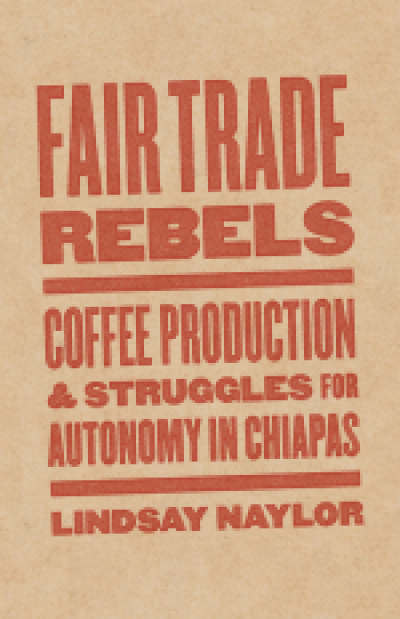
This paper discusses the Inpaeng Network, an alternative farmers' organization in Northeastern Thailand, and its cooperative ventures with state institutions. The primary aim is to show how by drawing on state development discourse participants in community economies can make use of government assistance and resources for their projects.
This research report was commissioned by the Australian Cooperative Housing Network, comprising Common Equity NSW, Common Equity Housing Ltd, the Federation of Housing Collectives, and Common Equity Housing South Australia. The report details the evidence for identified benefits of cooperative housing, the variables of business models in operation, and core enabling factors. On that basis, the report then presents a framework for a research methodology to capture primary data on the generation of value by rental cooperatives in Australia. It then presents an outline of the Australian context and sector and a review of cooperative housing sectors in selected countries. The country profiles are followed by a top-level overview of major global trends in cooperative housing.
We use two Christchurch case studies to think about the temporality of commoning, concluding that even transitional and temporary commoning can help normalise and make visible the practice, thus enabling commoner subjectivities.
In this era of human-induced environmental crisis, it is widely recognized that we need to foster better ways to sustain life for people and planet. For us – and other scholars drawing on the Community Economies tradition – better worlds begin in recognising the diverse and interconnected ways human communities secure our livelihoods. Community Economies scholarship is a body of theory that evolved from the writings of geographers J.K. Gibson-Graham, which, for more than thirty years, has inspired others (including the three of us) to rethink economy as a space of political possibility.
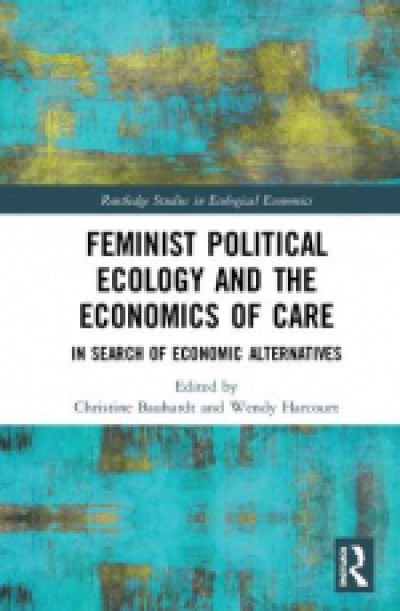
This short essay is one of 50 keyword essays published online by the Antipode Foundation to celebrate 50 years of the radical geography journal, Antipode. The essay overviews the idea of community + economy, and outlines various ways that community economies might be further activated.
The Community Economy essay can be downloaded here.
The full e-book of 50 keywords can be downloaded here.
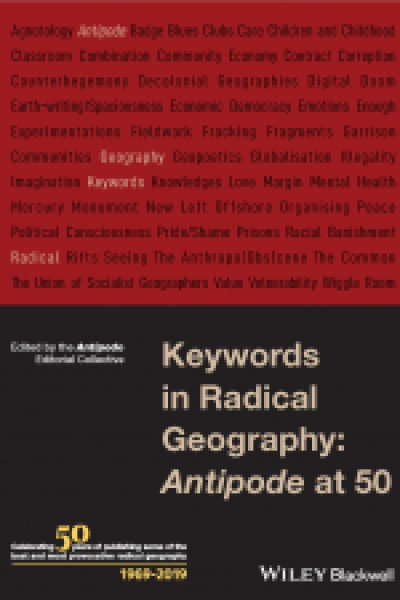
What does it mean to be at home in a hot city? One response is to shut our doors
and close ourselves in a cocoon of air-conditioned thermal comfort. As the climate
warms, indoor environments facilitated by technical infrastructures of cooling are
fast becoming the condition around which urban life is shaped. The price we pay for
this response is high: our bodies have become sedentary, patterns of consumption
individualized, and spaces of comfortable mobility and sociality in the city, termed
in this paper as “infrastructures of care,” have declined. Drawing on the findings
of a transdisciplinary pilot study titled Cooling the Commons, this paper proposes
that the production of the home as an enclosed and private space needs to be
Much of the debate over sustainable development revolves around how to balance the competing demands of economic development, social well-being, and environmental protection. “Jobs vs. environment” is only one of the many forms that such struggles take. But what if the very terms of this debate are part of the problem? Reimagining Livelihoods argues that the “hegemonic trio” of economy, society, and environment not only fails to describe the actual world around us but poses a tremendous obstacle to enacting a truly sustainable future.
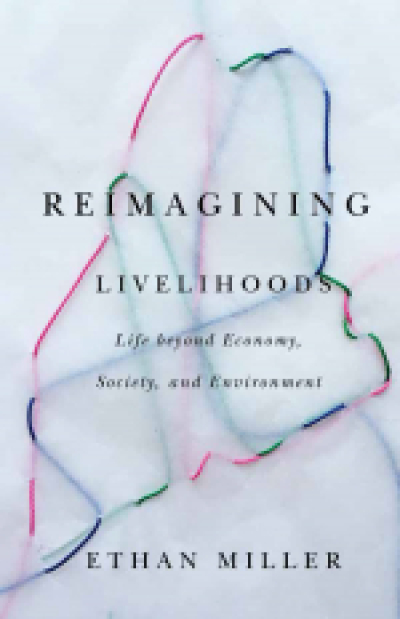
This article addresses the current restructuring of academia in Turkey through the example of the Academics for Peace petition and the institutional mechanisms of repression it instigated. We focus on the Solidarity Academies as alternative spaces of education and a unique form of collective resistance against the academic purges. We provide an empirically informed analysis of Solidarity Academies as spaces of commoning, the collective production and sharing of knowledge by emergent communities of struggle.
We are thrilled by Vicky Lawson’s deeply appreciative response to the Roepke Lecture and the written article. In her response, Vicky does more than we could ask for by inviting economic geographers to think with us about ways of reworking manufacturing (and other economic activities) that center on care for the well-being of people and of the planet. Vicky goes to the heart of our project by highlighting the importance we place on looking for the ethical openings that arise in the current context of climate change and growing socioeconomic inequality. As she identifies, part of our armory includes tactics of attending to already existing possibilities that are hidden from view and reframing understandings of what an economy is for.
In a world beset by the problems of climate change and growing socioeconomic inequality, industrial manufacturing has been implicated as a key driver. In this article we take seriously Roepke’s call for geographic research to intervene in obvious problems and ask can manufacturing contribute to different pathways forward? We reflect on how studies have shifted from positioning manufacturing as a matter of fact (with an emphasis on exposing the exploitative operations of capitalist industrial restructuring) to a matter of concern (especially in advanced economies experiencing the apparent loss of manufacturing). Our intervention is to position manufacturing for the Anthropocene as a matter of care.
This note explores examples of co-operative ways of organizing work and life that are rooted in a desire for radical eco-social change. We look at and unravel the politics of work and the ecology of support of Footprint, a worker-owned printing co-operative, which is located in Leeds (UK). The first part places special attention on the values and value-practices that inform the co-op’s daily activities, while the second part explores how the sustainability of Footprint’s radical working methods are interlinked with their participation in a (trans)local ecology of social and environmental activism.
In 2012, I was involved in the experimental study program, Campus in Camps, which is located in the West Bank and which brought together 15 third-generation refugees to study the contemporary condition of Palestinian refugee camps and to speculate about their potential futures. In this article, I draw on my experience at Campus in Camps in order to reflect on how design and speculation can be activated by designers and non-designers to speculate with care about the matters of their own lives. To explore the potential held by the design speculations produced at Campus in Camps, I draw on the work of feminist philosopher Marìa Puig de la Bellacasa around " matters of care ".
This article draws from and advances urban studies literature on ‘creative city’ policies by exploring the contradictory role of queer arts practice in contemporary placemarketing strategies. Here I reflect on the fraught politics surrounding Radiodress’s each hand as they are called project, a deeply personal exploration of radical Jewish history programmed within Luminato, a Toronto-based international festival of creativity. Specifically, I explore how Luminato and the Koffler Centre, a Jewish organisation promoting contemporary art, regulated Radiodress’s work in order to stage marketable notions of ethnic and queer diversity. I also examine how and why the Koffler Centre eventually blacklisted Radiodress and her project.
This essay reflects on two chapters on the theme of 'social entrepreneurship, relationality and the possible.' The essay explores how these chapters take a relational view of the world by featuring the importance of the relationships between people, and between people and ‘things’. What emerges from the two chapters are insights into social entrepreneurship as a social change practice not so much for finding accommodations in what is already present but for shifting the frame of what is thinkable and doable. The two chapters document strategies for social change while also recognising that social change is an unpredictable and uneven process that involves responding to the unexpected.
This contribution calls attention to the values of assemblage thinking for the study of contentious economies. A syntactical perspective can make visible social arrangements that are otherwise difficult to represent in traditional social movement categories. With the help of a jar of jam, an object that has meaningful entanglements in anti-camorra activism in Campania (Italy), the article begins by empirically illustrating instances of mobilisation that disrupt relationships of mafia dependency. The focus lies on the force of composition, the syntax of contention. The second section moves on to explore the theoretical backdrop of the analysis, and does so by suggesting some possible points of dialogue between social movement studies and assemblage thinking.
What does it mean to be at home in a hot city? One response is to shut our doors and close ourselves in a cocoon of air-conditioned thermal comfort. As the climate warms, indoor environments facilitated by technical infrastructures of cooling are fast becoming the condition around which urban life is shaped. The price we pay for this response is high: our bodies have become sedentary, patterns of consumption individualized, and spaces of comfortable mobility and sociality in the city, termed in this paper as “infrastructures of care,” have declined.
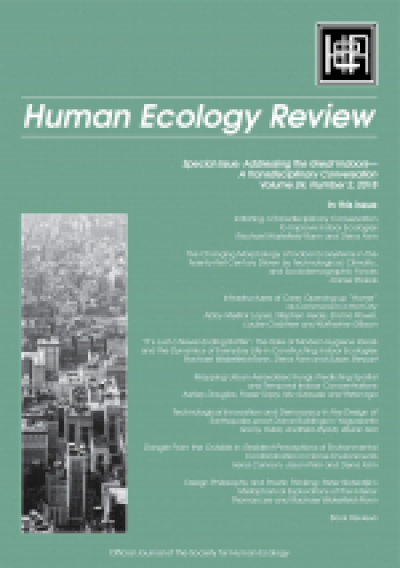
Despite the shortened commodity chain created for coffee through fair trade, there still exist a number of actors within certified commodity exchange. This chain is populated by disproportionately engaged actors, from a consumer looking for the certification seal, to coffee roasters working directly with coffee producing cooperatives, to producers striving to keep up with the standards for certification. Despite such disparities, connections are made between the roasters and the growers of coffee at multiple sites, from community-based projects to the transfer of knowledge and storytelling beyond the communities where coffee is cultivated.
Provoked by mass evictions and the onset of gentrification in the 1970s, tenants in Washington, D.C. began forming cooperative organizations to collectively purchase and manage their apartment buildings. These tenants were creating a commons, taking a resource—housing—that had been used to extract profit from them, and reshaping it as a resource that was collectively owned and governed by them. In Carving Out the Commons, Amanda Huron theorizes the practice of urban commoning through a close investigation of the city’s limited-equity housing cooperatives.
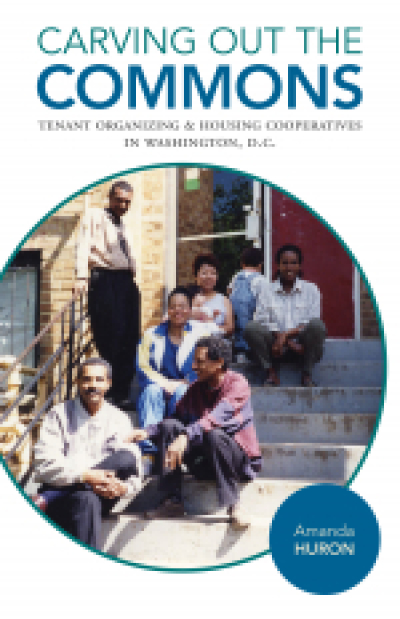
This article examines unpaid work within urban agriculture sites. It focuses on the extra work—the surplus labor—that is performed to sustain these sites and how this work relates to subject formation. Land access and subjectivities are widely discussed in the urban agriculture literature, particularly in the Global North, but recent research has also identified the continual supply of labor as a crucial issue as well. However, work dynamics of urban agriculture have seldom been the object of analysis, and little is known about the relationship between unpaid urban agriculture work and subjectivity. I argue that surplus labor is useful for analysis because of the surplus value that is produced through urban agriculture.
This public declaration was one outcome from the Reconfiguring the Enterprise Research Project. It was written and signed by the research team (Katherine Gibson, Stephen Healy, Jenny Cameron and Joanne McNeill) and the participating Australian manufacturers. The declaration was widely distributed, including to state and Federal members of parliament. It has contributed to ongoing discussions about the direction of Australian manufacturing in the 21st century.
In this article I engage with Latour's concept of 'learning to be affected' to think about the possibility of co-parents developing a kind of 'maternal intuition' based on embodied infant hygiene care practices. This is one of the most difficult articles I have written, and it took many years and spanned many of my own babies!
This review essay engages with Maria Puig de la Bellacasa's book Matters of Care: Speculative ethics in more-than-human worlds. I discuss the style of affirmative critique she uses in her work.
We describe the PhD Journey as one which is logistical, emotional and intellectual. We analyse our own experiences of collectivising aspects of doctoral study and supervision in the post-disaster context of Christchurch, describing -- and assembling -- a hybrid caring collective that included a variety of things from quakes to cakes.
The paper has been collaboratively written with co‐researchers across Southeast Asia and represents an experimental mode of scholarship that aims to advance a post‐development agenda.This paper introduces the project of documenting keywords of place‐based community economies in Monsoon Asia. It extends Raymond William’s cultural analysis of keywords into a non‐western context and situates this discursive approach within a material semiotic framing. For Open Access, click here.
This book chapter outlines the basics of diverse economies and the idea of capitalocentrism for an audience in international political economy.
Deepening ecological crisis alongside a half century of widening inequality and economic instability are evidence that Business as Usual cannot go on. Transformation is required, particularly in the realm of corporate activity, the business of business. Shareholder primacy is a powerful social norm that constrains transformation. It positions publicly traded corporations as compelled by competitive necessity and bound by law to place shareholder returns first. This paper reviews critical legal theory that questions the historical precedence, legal coherence and practical consequence of shareholder primacy in corporate law. I consider Deakin’s (2011) suggestion that it might be more appropriate to think of the corporation as a commons managed for the benefit of multiple parties.
This paper stages an encounter between Relational Poverty Theory (RPT) and the solidarity economy movement. RPT understands poverty as the dynamic product of economic exploitation, political exclusion and cultural marginalization. The solidarity economy movement can be seen as a transformative political response to these dynamics aiming to replace exploitation with cooperation, exclusion with participation and marginalisation with practices of inclusion. Globally, more than sixty solidarity economy movements are coordinating efforts, developing associative relations between cooperative economic institutions, social justice movements, and one another. While these developments are encouraging, many practitioners are concerned about the movement’s future.
This paper, forthcoming in Arena reflects on the late Zygmunt Bauman's essay on the work ethic published in Arena in 1996. I began this paper the day after Zygmunt died, and took up with his question of what happens to the poor in a world where work disappears. His essay seemed to presage many of the current debates about postcapitalism, new forms of automation, the future of work and the role that basic income may play in a world with less work in the formal economy. In the current moment a life beyond capitalism seems more discernible, either as a post-work utopia or a condition of permanent precarity.
